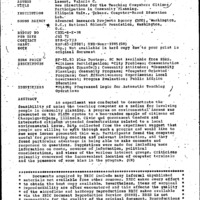New Directions for the Teaching Computer: Citizen Participation in Community Planning (1972)
Item
of 1
- Title
- New Directions for the Teaching Computer: Citizen Participation in Community Planning (1972)
- Creator
- Lamont, Valarie C.
- Language
- English
- Subject
- PLATO (Programmed Logic for Automatic Teaching Operations)
- Environmental Activism
- Community Planning
- Citizen Participation
- Community Programs
- Computer-Based Education
- Sustainability
- Environmental Issues
- Computer Programs
- Community Engagement
- Public Affairs
- Public Policy
- Local Government
- Description
- Report by Valarie Lamont on an experiment conducted using the PLATO computer system for community oriented environmental activism. Lamont created an interactive PLATO program which presented information about the Boneyard Creek local environmental issue through text, photo slides, maps and graphs on the PLATO terminal and promoted community engagement through user feedback by computer program participants using 'comment mode' to offer suggestions, ask questions, or critique the program information or complete a digital questionnaire.
- Relation
- Sponsoring Agency: Advanced Research Projects Agency (DOD), Washington, DC
- Sponsoring Agency: National Science Foundation, Washington, DC.
- Contract Number: NSF-C-723.
- Contract Number: NSF-65-29981.
- Contract Number: ONR-Nonr-3985(08).
- ERIC Note: Not available in hard copy due to poor print in original document.
- Publisher
- ERIC Clearinghouse
- Date
- 1972
- Identifier
- Finding Aid
- Source
- CERL-R-X-34
- Coverage
- Computer Based Education Research Laboratory (CERL)
- University of Illinois
- Urbana-Champaign, Illinois
- Abstract
- An experiment was conducted to demonstrate the feasibility of using the teaching computer as a medium for involving people in community planning. A program on environmental issues was presented on the PLATO system to a non-random sample of citizens of Champaign-Urbana, Illinois. Civic and government leaders and interested citizens attended demonstrations related to a local environmental issue. Data collected from the experiment suggest that people are willing to work through such a program and would like to see more issues presented this way. Participants found the computer useful for presenting concise and relevant information, and they found particular advantage in being able to make comments and responses to questions. Suggestions were made for including more information on costs, sources of information, political considerations, and views of the various interest groups. Criticisms primarily concerned the inconvenient location of computer terminals and the presence of some bias in the program. (CH)
- Bibliographic Citation
- Lamont, Valarie C. New Directions for the Teaching Computer Citizen Participation in Community Planning. CERL-R-X-34, Distributed by ERIC Clearinghouse, 1972.
- Contributor
- Educational Resources Information Center (U.S.)
- Computer Based Education Research Laboratory (CERL)
- Site pages
- PLATO Reports and Research
